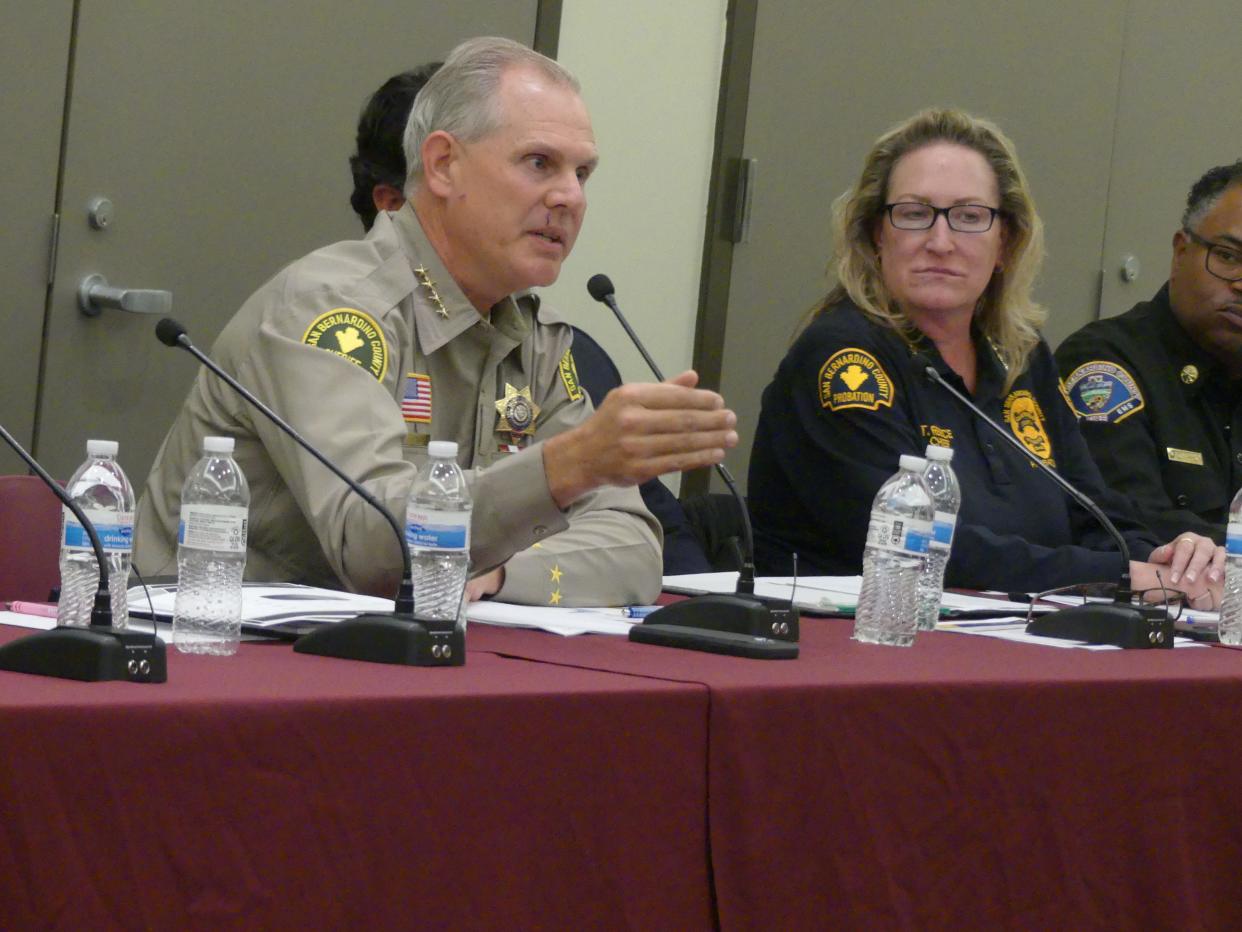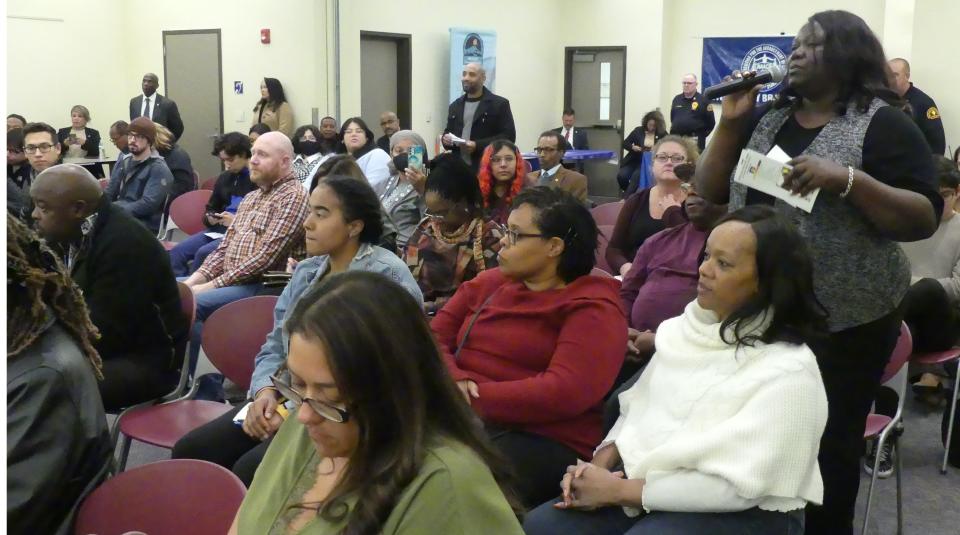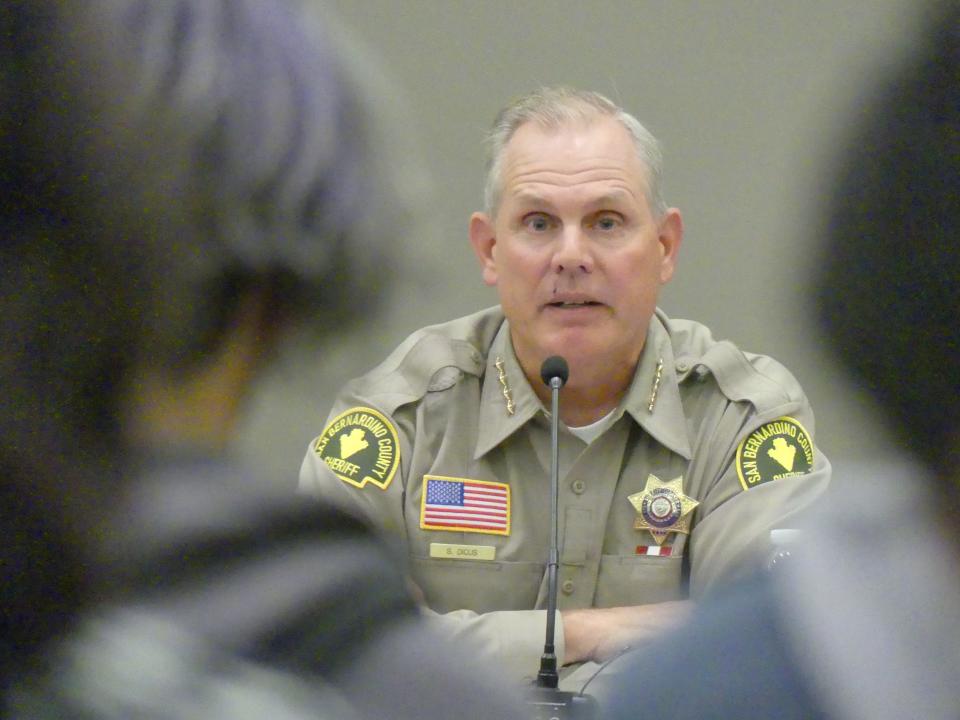Equity Element Group holds Town Hall meeting at Victor Valley College

- Oops!Something went wrong.Please try again later.
Members of the Equity Element Group held their first-ever Town Hall on Monday at Victor Valley College in Victorville, with San Bernardino County public safety and community leaders invited to discuss strategies to achieve equity.
The equity group was formed after the May 2020 death of Black resident George Floyd at the hands of a white Minneapolis police officer.
Discussions regarding the incident led to the San Bernardino County Board of Supervisors in June 2020 declaring racism a public health crisis.
The board also tasked the SBC Administrative Office to form an equity group representing the 11th element of the Countywide Vision.
The group began meetings and discussed various topics such as achieving equity in health, home ownership, jobs, economic development, education, public safety, infrastructure and civic engagement.

The Town Hall
The Equity Group’s Town Hall panel included San Bernardino County Sheriff Shannon Dicus, SBC Chief Probation Officer Tracy Reece, District Attorney Jason Anderson, Public Defender Thomas Sone and SBC Fire Deputy Chief Bertral Washington.
Also, Equity Element Group members Bill Thomas with the NAACP High Desert Branch and Pastor Samuel Casey with Congregations Organized for Prophetic Engagement.
Additionally, Assistant County Administrator Diana Alexander, Phyllis K. Morris-Green from Reimagining Our Communities and President/CEO George Lamb from the Faith Advisory Council for Community Transformation.
Regina Weatherspoon-Bell served as moderator of the event, which was held in the Student Activities Center on the upper campus of VVC.
During the meeting, the panel shared highlights and fielded questions from the audience, mainly students, community leaders and agency officials.
Sheriff Dicus said one of his first actions since taking office was to look at offender reentry.
“If minorities are entering the criminal justice system disproportionately, they’re leaving disproportionately,” Dicus told the audience. “We’re investing in Sheriff’s Department resources to give somebody a second chance, should they choose to want to do that.”
He also mentioned the sheriff’s Homeless Outreach and Proactive Enforcement (H.O.P.E.) program, a program designed to reduce calls for service and other resources currently required to serve the homeless population.
The program’s objective is to stop the revolving door of arrest and incarceration and then release regarding homeless-related crimes.
To achieve a more diverse examination of his office, DA Anderson said he started a community commission nearly four years ago that included 40 people, which met with him quarterly to examine the workings of the criminal justice system.
“We developed a civil liberties curriculum taught in three of the San Bernardino County schools,” Anderson said. “We taught high school students about their constitutional rights, how to limit their contact with law enforcement, and to understand the value of when law enforcement contacts them.”
Anderson explained that the curriculum educates students on their legal rights should they get stopped for a simple traffic violation.
Office Reece explained that while 8 to 9% of the county’s population is African American, approximately 18% of the probation department is staffed by the same demographic.
“Additionally, African Americans managers number 18% in our department,” Reece said. “And I can proudly tell you that 40% of our executive team are African Americans.”

African American students
Millionaire Mind Kids President and CEO Delores Williams asked Sheriff Dicus to “explain why” African American students in the Victor Valley Union High School District are treated differently than white students.
Williams was referring to a report in August by the Office for Civil Rights that determined that VVUHSD discriminated based on race in violation of the Civil Rights Act of 1964 by disciplining Black students more frequently and more harshly than white students. The Office for Civil Rights opened the investigation into VVUSD in 2014.
The Sheriff’s Department was not mentioned in the Office for Civil Rights federal investigation case.
Dicus told Williams that he was familiar with the Department of Justice investigation, including the SBC Sheriff’s Department.
The DOJ investigating the SBCSD could stem from the U.S. Department of Education’s Office for Civil Rights exploring the VVUHSD.
In September, a Department of Justice investigation led the San Sheriff’s Department to suspend its CleanSWEEP program at approximately 100 campuses.
Launched on three high school campuses in 1999, CleanSWEEP was billed by the SBCSD as a “unique,” one-of-a-kind, comprehensive and all-inclusive effort to protect county students.
The program is campus led and disciplinary, designed to address minor offenses in a school setting through non-criminal procedures, focusing on keeping students in school and not being suspended or expelled.
Dicus explained that sheriff’s deputies do not cite students but retrieve the citations from school administrators. Sheriff’s officials then review the citations and divert them to a commissioner.
Dicus said he asked the civil rights investigators when they came in, “Look, what’s the problem here? If we’re hurting children, I’ll fix it right now.”
According to Dicus, investigators told him, “I can’t tell you.”
“So they left me to cancel the program and its entirety,” Discuss said. “If I’m hurting kids, that’s the last thing I want to do. “
Sheriff Dicus sent a letter to all CleanSWEEP participating school districts, informing them of the suspension. The letter contained the following information:
“I feel compelled to take this step out of an abundance of caution and better to focus our ongoing response to DOJ requests and inquiries,” Dicus stated.
The California Department of Justice recently informed the SBCSD that it was investigating CleanSWEEP in light of “some concerns expressed to the DOJ” about the program. Dicus said.
“While we have repeatedly asked what those concerns are, the DOJ has unfortunately refused to tell us,” Dicus said. “Nevertheless, my department has been diligently working with the DOJ.”
Over the past several months, the department provided extensive records, materials and pertinent information, Dicus said.
“I’m concerned about our kids, no matter what color they are,” Dicus told Williams. “And if anything disproportionately is going on, I’ll fix it.”
Dicus ended his response by saying the Sheriff’s Department is trying to empower school administrators to do the citations and “not the cops.”
“All we are is a collection point between the commissioner reviewing the case with the kids and the administrator that cites the children,” Dicus said.
The Equity Element Group
“The Equity Element Group was formed of influential and prolific members of the Black community who are working together to continue improving our communities,” said Curt Hagman, chairman of the Board of Supervisors. “We are looking forward to the recommendations they will make to help us close gaps in services and opportunities for Black residents and people of color who live and work in our county.”
Members of the Equity Element Group include:
Hardy Brown – Black Voice News
Keynasia Buffong – National Black Grads
Pastor Samuel Casey – Congregations Organized for Prophetic Engagement (COPE)
Willie Ellison – Southern California Black Chamber of Commerce
George Lamb – Faith Advisory Council for Community Transformation (FACCT)
Tammy Martin-Ryles – Black Chamber of Commerce
Tremaine Mitchell – Youth Action Project
Phyllis K. Morris-Green – Reimagining Our Communities (ROC)
Bishop Kelvin Simmons – Inland Empire Concerned African American Churches (IECAAC)
Deborah Smith- Gilbert – IE National Council of Negro Women (IENCNW)
Terrance Stone – Young Visionaries Youth Leadership Academy
Bill Thomas – NAACP, High Desert Branch
Dina Walker – BLU Educational Foundation
Reggie Webb – Cooperative Economic Empowerment Movement (CEEM) and Westside Action Group (WAG)
Keith Willis – 100 Black Men of the Inland Empire
Chache Wright – NAACP
The Equity Element Group is tasked with determining where there may be racial disparities among residents in SBC.
Also, to see if campaigns and programs could be implemented to solve those issues and identify initiatives already underway within the county government or the county community that can be highlighted and supported.
“As a member of the Equity Group, I am proud to serve in partnership with the County of San Bernardino as we address the issue of racism being a health crisis by allowing opportunities for people of color to become stakeholders in housing, jobs, and education,” said Smith-Gilbert. “I look forward to working within our collaborative groups to make change for our families, communities, and ourselves.”
“While June 23, 2020, might’ve been a historic moment for San Bernardino County and community, we refuse to let up and allow this process to become merely ceremonial,” said Pastor Casey. “We have an opportunity to create and make lasting change that will live beyond us. We must continue to be bold, courageous, and daring; to not only acknowledge that racial inequities exist but also do the hard work of remediating the generational trauma that has historically plagued us far too long!”
“I applaud the County of San Bernardino for being the first in the state to declare racism a public health crisis,” Mitchell said. “The creation of the Equity Group demonstrates the County’s commitment to translating that declaration into actions that will help create communities where all can thrive.”
In 2011, the Board of Supervisors and San Bernardino Council of Governments adopted the Countywide Vision, a roadmap for the county's future with an emphasis on 10 elements, including public safety, education, jobs, and the economy, wellness, and housing.
The Countywide Vision recognizes that each of these elements is interrelated and interdependent.
Element groups working to achieve the Countywide Vision have produced the Vision2Read literacy campaign, the Vision2BActive wellness campaign, the Vision4Safety public safety campaign, and the Vision2Succeed campaign created by the jobs and economy element group.
Daily Press reporter Rene Ray De La Cruz may be reached at 760-951-6227 or RDeLaCruz@VVDailyPress.com. Follow him on Twitter @DP_ReneDeLaCruz.
This article originally appeared on Victorville Daily Press: Equity Element Group holds Town Hall at Victor Valley College

